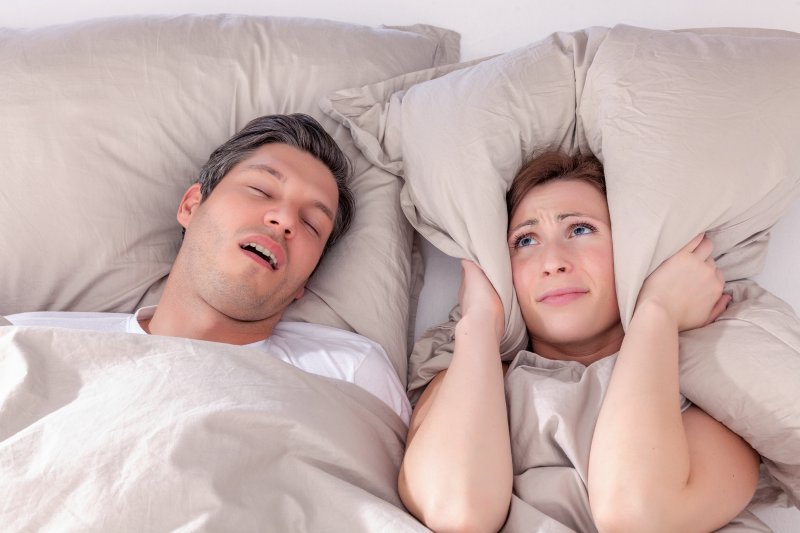
Think you may be suffering from sleep apnea in Columbus? This common disorder affects millions of people each year in the United States, but did you know there are actually three forms of sleep apnea? Knowing which one you suffer from may not be easily identifiable, but if you take the necessary steps to seek help from a professional sleep dentist, you can be on your way to understanding the cause, your symptoms, and how best to treat it. Read on to learn more about the different forms of sleep apnea and which treatment is right for you.
Obstructive Sleep Apnea: The Most Commonly Diagnosed
According to the National Sleep Foundation, it is estimated that between 5 and 20% of adults have obstructive sleep apnea (OSA). This commonly diagnosed condition occurs when there is a partial or full blockage within a person’s airway. When the throat muscles relax, the tongue and/or fatty tissues fall to the back of the throat, making it difficult for the individual to receive adequate airflow.
People who suffer from OSA most often experience the following symptoms:
- Ceased breathing or frequent interruptions while asleep
- Moodiness (i.e. depression, irritability)
- Gasping for breath throughout the night
- Chronic snoring
- Restlessness
- Chronic fatigue
- Morning headaches
- Difficulty concentrating
Those who are most at risk for developing OSA include individuals who:
- Are obese or overweight
- Smoke or use tobacco products
- Consume excess alcohol
- Have enlarged tonsils or adenoids
- Are older in age
- Have a family history of OSA
Central Sleep Apnea: When Problems Exist Within the Brain
Individuals with Central Sleep Apnea (CSA) have difficulty achieving adequate rest because of the brain’s inability to signal the muscles that control a person’s breathing. Considered to be more a communicative problem between the brain and body, it is much less common and can be attributed to various medical conditions (i.e. Parkinson’s disease, obesity, heart failure, those affecting the brain stem).
Many of the symptoms associated with OSA are also found in individuals with CSA, making it much harder to differentiate for individuals with no formal diagnosis. It’s important to remember that people who are over the age of 65, have heart disorders, have experienced a stroke or brain tumor, or are using opioid medications are at a greater risk of developing CSA, as are men more so than women.
Mixed Sleep Apnea: The Combination of OSA and CSA
Considered to be the most complex form, mixed sleep apnea is when symptoms of both OSA and CSA develop. If a patient is undergoing therapy with a continuous positive airway pressure (CPAP) device for OSA, that person can develop CSA while wearing the device. In fact, a study performed by the Mayo Clinic discovered that out of 223 individuals, 15% of sleep apnea patients suffering from OSA actually had mixed sleep apnea.
What Are Available Treatment Options?
Once you receive a formal diagnosis, a sleep dentist will be able to provide a more thorough explanation with regard to treatment. Many of the same solutions are administered for OSA, CSA, and mixed sleep apnea. These can include:
- CPAP therapy
- Oral Appliance Therapy
- Surgery
- Medications
In most cases, CPAP devices are commonly recommended for treatment; however, many patients may become what is known as “CPAP intolerant” or simply experience difficulty in maneuvering the bulky machinery. Instead, sleep dentists are suggesting oral appliance therapy as a more user-friendly, comfortable solution.
These compact, oral devices can move the lower jaw (mandible) downward just enough so that the tongue will move forward and prevent a potential blockage within the airway. During your examination, your sleep dentist will use the compiled information to recommend the appropriate oral appliance for you.
If you believe you may be suffering from sleep apnea, you are encouraged to take the Epworth Sleepiness Scale Quiz, which can help to identify whether it is likely you have sleep apnea or not.
About the Author
Dr. Shelley Shults is a board-certified registered nurse, general dentist,
family nurse practitioner, and dental sleep medicine practitioner. She
graduated from Wichita State University with a bachelor’s degree in Nursing
before going on to spend years working in a variety of nursing fields,
including everything from internal medicine to urgent care. In 2001, she
graduated from The Ohio State University with a Doctor of Dental Surgery
degree. She then received her MATRx certification in sleep apnea in 2013. Dr.
Shults and her team are proud to offer patients a solution to their sleep problems
and look forward to helping you achieve the rest you need. If you or a loved
one is suffering from sleep apnea, contact
us at (614) 396-9310.
